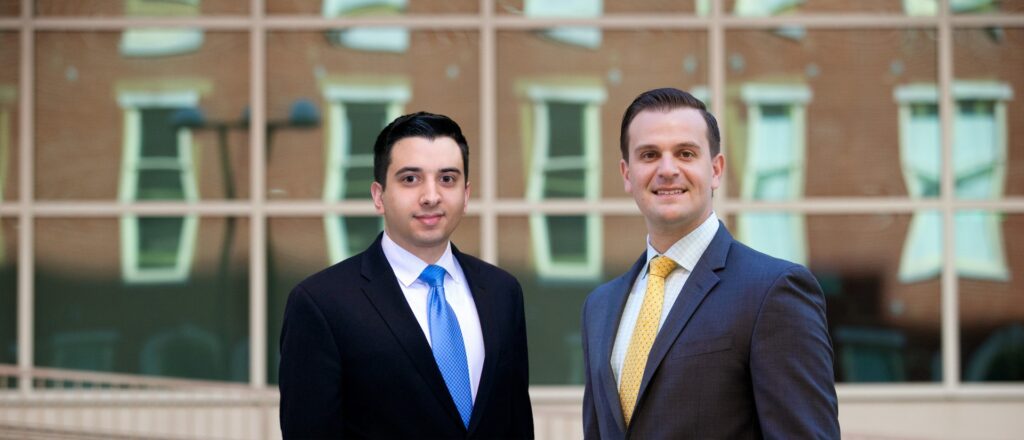Third-year law student Georgios Tsoflias and Andreas Andrews LAW ’14 don’t appear to have much in common, but what they do share is significant: both have earned clerkships on the U.S. Tax Court, an Article I court charged with interpreting the Internal Revenue Code and resolving disputes between taxpayers and the Internal Revenue Service.
“A Tax Court clerkship is really the brass ring of tax-related opportunities,” said Director of Graduate Tax Programs Kathy Mandelbaum. “As a tax faculty, we’re collectively very proud of George and Andreas.”
The admiration is very mutual. Both Tsoflias and Andrews cite the support and mentorship of the tax faculty as essential to their success in the field. “Temple Law’s tax faculty was not only an impetus for my career in tax law, but also a driving force,” recalled Andrews. “I spent hours in Professor Andrea Monroe’s and Professor Alice Abreu’s offices trying to understand the material. When they say their doors are always open, they really mean it. I never felt as though I couldn’t ask a question or go to them for help. They were truly mentors, guiding me towards my goals and supporting me along the way.”
Tsoflias concurs. “I am certain that I would not have had this opportunity without the devoted, supportive, and talented faculty members at Temple Law,” he remarked. “Professors Alice Abreu and Tom Lin, for example, have each given up hours of their time to advise me on how to navigate through the clerkship application process, and to discuss and advocate for my candidacy with Judge Pugh. I am fortunate to have such strong faculty mentors and I do not take their guidance for granted.”
Mandelbaum notes that of the five Temple graduates to go on to Tax Court clerkships over the past decade, Tsoflias is the first to do so directly out of law school. “It’s a remarkable achievement,” she said. “Most clerkships go to lawyers who have just completed their LL.M.s in Tax or have been in practice for a few years.”
Their paths to becoming tax lawyers could not have been more different. Tsoflias was first intrigued by the idea after a presentation in his high school accounting class, and pursued that interest through his undergraduate degree in Accounting to his enrollment at Temple Law. He chose Temple on the strength of its exceptional tax program. “When I was initially applying to law schools across the country, the strength of each school’s tax program was a considerable factor in my decision,” Tsoflias remarked. “Ultimately, I have no doubt that I made the right choice. I have taken a course in tax law during each semester that I was able to—including Taxation, Partnership Taxation, Corporate Taxation, Low Income Taxpayer Policy, and International Taxation—and have built a strong foundation in tax law.”
“I wanted to attend as many office hours as Professor Monroe (and later Professor Abreu) could tolerate – I was hooked.”
Andrews, who recently completed an LL.M. in Tax at NYU, is quick to point out that the variety of tax courses available at Temple is unusual. “Temple provides a wide array of tax courses that allows students the ability to appreciate the breadth of tax law,” he said. “Unlike some law schools that only offer introductory tax courses, Temple provides J.D.s and LL.M.s alike the ability to learn about a broad range of topics from some of the best professors and practitioners in the country.”
Andrews’ love for tax law, which he calls “nuanced and complex,” is clear. It was also unexpected. For Andrews, the “tax bug” bit in his second year of law school, when he took an introductory course taught by Professor Andrea Monroe. “I remember Professor Monroe’s Tax I class being filled to the brim, and being excited to learn about tax law. What I didn’t expect was to spend countless hours after class on problem sets and learning the material. I wanted to attend as many office hours as Professor Monroe (and later Professor Abreu) could tolerate – I was hooked,” he recalled.
“I am also extremely appreciative of the opportunity I had to learn under some of the best tax faculty in the country,” Andrews continued. “In today’s legal world, where there is a lack of traditional apprenticeships, my experiences at Temple truly provided me with a well-rounded skill set that propelled me to NYU’s Graduate Tax program, and eventually to my Tax Court clerkship. I can honestly say that without Temple and its tax law faculty, I would not love what I am doing today.”

